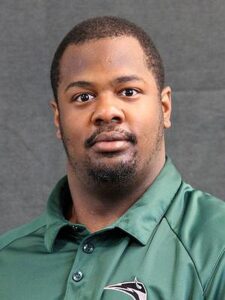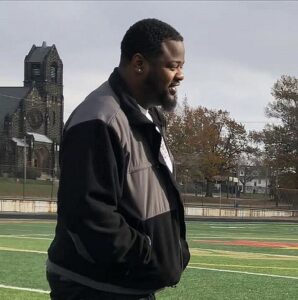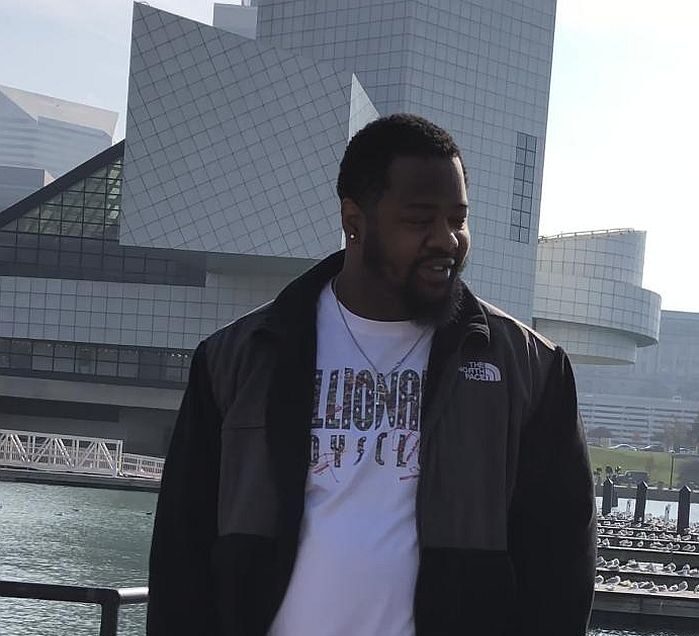|
|
By Katarina Partika
Before embarking on a journey to help young athletes with their mental health, Cleveland native and former football star Jeremy Boone had to face his own set of mental health concerns.
Looking back, Boone realizes the times he was in transition were the times he needed the most help. “I played college football myself. I had a brief stint in the CFL [Canadian Football League],” he said. “When I was done playing, I was lost. I didn’t really have a direction. I didn’t really know what I wanted to do. It took me a couple of years to realize I was in a depression. And once I realized I was in a depression and I was not living up to my potential, I realized that my goal is to give back to my city, my community, people who look like me.”

Growing up on Cleveland’s east side, Boone recalled grappling with mental health at a young age. His parents divorced his freshman year in high school, and he was sent to live with his grandfather in Shaker Heights. He did not adapt well to the change. “It was a complete culture shock for me,” he said. “Growing up, [in] Cleveland Public Schools, I was going to school with everyone who looked just like me.” At Shaker Heights, Boone saw the complete opposite. He struggled to apply himself, didn’t engage with teachers, and received multiple truancy calls, ultimately becoming ineligible for his sophomore year football season. “My mom and dad were recently separated. My grandfather, I was living with him, but he just recently had open-heart surgery. So, it was just a lot.”
The tides did not begin to shift until Boone’s junior year. “I began building relationships with the teachers, staying after school, extra help, and conferences. I started to realize I had an opportunity to go to Division I football.” With more and more scholarship prospects, Boone set his sights on the University of Cincinnati. However, because of his previous academic performance, Boone did not pass the NCAA clearinghouse. “Knowing that the dreams that you have don’t always come true, it was very humbling for me,” he said.
Looking back, Boone now realizes that he was slipping into a depression. He felt lost and without hope until he got a call from the coach at College of the Canyons in California asking him to join the team. Although the lack of scholarship money resulted in some financial turmoil, Boone says that two-year stint at junior college was one of the best times of his life. His teammates were just as broke as he was. Their drive and passion for the game made their bond stronger. “I had days that I didn’t eat. But the camaraderie that we built with our friendships was because we were all striving to get to the same level,” he said. “We all wanted to play professional football. We all had that common goal with one another.”
Following junior college, Boone decided to stay on the West Coast and play for Portland State University, where he received his bachelor’s degree in sociology. After graduation, he joined the BC Lions practice squad, a Canadian professional football team in British Columbia. His time there was short-lived. He was cut from the team. Boone was only 24, and he thought his life was over. “When I was done playing, I was lost. I didn’t have a direction,” he said. He now understands that he was depressed. His mindset began to affect all areas of his life. “Some of the things I was doing, like I can’t even imagine myself doing now. I was getting into it with family members. My brothers. Angry with them. Just very angry. But not realizing that it’s [the internal] I have

to deal with.”
Boone was also going through a divorce. His behavior led to “seven years of lost time” including a felony conviction in 2016 for fleeing the scene of a car accident. In hindsight, Boone saw a pattern. The transition periods in his life—the times without football—were the times he lacked direction. He reached out for help and began therapy. Self-reflection, though difficult, was key. “Sometimes you don’t want to look at that because it could be an ugly sight,” he said. Boone believes that if he had had someone to talk to sooner, it would have saved him years of heartache. “When you have so many thoughts built up and not addressing them, sometimes that outpour can affect everyone around you.”
Boone, now a social worker with the Department of Children and Family Services of Cuyahoga County, will soon earn his Master of Social Work from Case Western Reserve University. Once completed, his goal is to work with athletes experiencing a transition in their lives or careers. He wants to save other athletes from traveling a road similar to the one he endured. “If I had someone when I got done playing football—that transition—I think I would have avoided those seven years of lost time,” he said. “But you know, it still made me the man that I am, so I’m happy about that.”
The Cleveland Observer, committed to producing content through a solution-based lens utilizing the four fundamental pillars of Solutions Journalism, aims to address major issues and concerns by establishing a student-led permanent news desk. This initiative, called the Solutions Journalism Student Media Challenge, will enable the Cleveland Observer to form a team of “Observers.” These students will be assigned specific topics and events to report on, contributing to a database that creates impactful content. This effort is supported through the HBCU + Black Press fellows cohort grant from The Solutions Journalism Network, which reinforces SJN’s commitment to historically underserved communities.








